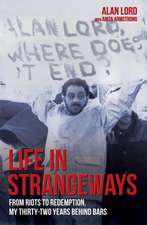Victims of Violence and Restorative Practices: Finding a Voice: Routledge Frontiers of Criminal Justice
Autor Tinneke Van Campen Limba Engleză Hardback – 11 iun 2014
Based on original research and qualitative interviews with victims of violent crime, this book draws on procedural justice theory and socio-psychological studies and analyses how victims value restorative interventions. The findings shed a light on the factors that contribute to victim satisfaction with restorative interventions and show how they relate to procedural fairness, as well as allow an exploration of how the timing of the restorative intervention in the criminal justice proceedings affects victim appreciation.
With its use of in-depth interviews and case descriptions, this book will be of interest to academics, practitioners and students alike. It will be of particular interest to those engaged in the study of victims and victim concerns, restorative justice and procedural justice.
Din seria Routledge Frontiers of Criminal Justice
-
 Preț: 303.16 lei
Preț: 303.16 lei -
 Preț: 289.85 lei
Preț: 289.85 lei -
 Preț: 311.06 lei
Preț: 311.06 lei -
 Preț: 301.54 lei
Preț: 301.54 lei -
 Preț: 349.87 lei
Preț: 349.87 lei -
 Preț: 309.55 lei
Preț: 309.55 lei -
 Preț: 310.12 lei
Preț: 310.12 lei -
 Preț: 313.08 lei
Preț: 313.08 lei -
 Preț: 152.71 lei
Preț: 152.71 lei -
 Preț: 279.99 lei
Preț: 279.99 lei -
 Preț: 311.85 lei
Preț: 311.85 lei -
 Preț: 287.89 lei
Preț: 287.89 lei -
 Preț: 283.04 lei
Preț: 283.04 lei - 8%
 Preț: 388.77 lei
Preț: 388.77 lei -
 Preț: 312.54 lei
Preț: 312.54 lei -
 Preț: 323.91 lei
Preț: 323.91 lei -
 Preț: 151.96 lei
Preț: 151.96 lei -
 Preț: 326.49 lei
Preț: 326.49 lei -
 Preț: 325.45 lei
Preț: 325.45 lei - 8%
 Preț: 389.00 lei
Preț: 389.00 lei - 9%
 Preț: 865.41 lei
Preț: 865.41 lei -
 Preț: 250.40 lei
Preț: 250.40 lei -
 Preț: 341.55 lei
Preț: 341.55 lei - 18%
 Preț: 1057.89 lei
Preț: 1057.89 lei - 18%
 Preț: 1053.64 lei
Preț: 1053.64 lei - 18%
 Preț: 1172.23 lei
Preț: 1172.23 lei -
 Preț: 390.54 lei
Preț: 390.54 lei -
 Preț: 491.26 lei
Preț: 491.26 lei - 18%
 Preț: 1106.81 lei
Preț: 1106.81 lei - 18%
 Preț: 1170.74 lei
Preț: 1170.74 lei - 18%
 Preț: 1057.75 lei
Preț: 1057.75 lei -
 Preț: 276.68 lei
Preț: 276.68 lei -
 Preț: 401.54 lei
Preț: 401.54 lei - 13%
 Preț: 310.05 lei
Preț: 310.05 lei -
 Preț: 463.62 lei
Preț: 463.62 lei - 18%
 Preț: 1000.27 lei
Preț: 1000.27 lei - 18%
 Preț: 1006.92 lei
Preț: 1006.92 lei - 18%
 Preț: 1170.74 lei
Preț: 1170.74 lei - 18%
 Preț: 997.90 lei
Preț: 997.90 lei - 18%
 Preț: 1109.99 lei
Preț: 1109.99 lei - 18%
 Preț: 1175.72 lei
Preț: 1175.72 lei - 18%
 Preț: 1109.99 lei
Preț: 1109.99 lei -
 Preț: 354.21 lei
Preț: 354.21 lei - 18%
 Preț: 1107.61 lei
Preț: 1107.61 lei
Preț: 819.25 lei
Preț vechi: 1140.06 lei
-28% Nou
Puncte Express: 1229
Preț estimativ în valută:
156.76€ • 163.67$ • 129.74£
156.76€ • 163.67$ • 129.74£
Carte tipărită la comandă
Livrare economică 05-19 aprilie
Preluare comenzi: 021 569.72.76
Specificații
ISBN-13: 9780415856157
ISBN-10: 0415856159
Pagini: 206
Ilustrații: 4 black & white tables
Dimensiuni: 156 x 234 x 18 mm
Greutate: 0.42 kg
Ediția:1
Editura: Taylor & Francis
Colecția Routledge
Seria Routledge Frontiers of Criminal Justice
Locul publicării:Oxford, United Kingdom
ISBN-10: 0415856159
Pagini: 206
Ilustrații: 4 black & white tables
Dimensiuni: 156 x 234 x 18 mm
Greutate: 0.42 kg
Ediția:1
Editura: Taylor & Francis
Colecția Routledge
Seria Routledge Frontiers of Criminal Justice
Locul publicării:Oxford, United Kingdom
Public țintă
Postgraduate and UndergraduateCuprins
Introduction 1. Two approaches to promote justice for victims of crime and where they meet 2. Restorative justice implemented – the Canadian and Belgian case 3. The restorative procedure valued irrespective of its outcome 4. Finding a voice and entering into a dialogue 5. Meeting diverse motives 6. The role of the restorative approach before and after judicial adjudication Conclusion.
Notă biografică
Tinneke Van Camp has worked as a research assistant at the Catholic University of Leuven and the National Institute for Criminalistics and Criminology (Belgium). In 2011, she obtained a PhD in criminology from the University of Montreal (Canada). In 2013, Tinneke joined the School of Law at the University of Sheffield. Her main interests lie in victim experiences with restorative justice and judicial proceedings.
Recenzii
‘This engaging book uses in-depth interviews held with victims of severe crimes to assess how they cope with what happened to them and how justice can be restored for these people. The book points out the importance of perceived procedural justice and notes that when victims are given a voice and receive respectful treatment this suggests a good way of responding to the needs of the victims involved and substantially increases chances of restorative justice.’ - Kees van den Bos, Ph.D., Professor of Social Psychology and Professor of Empirical Legal Science, Utrecht University, The Netherlands
‘Drawing on an empirical study of victims of violence in Canada and Belgium, Van Camp has produced a rigorous and enlightening account of how such victims view restorative interventions. Lucidly written and persuasively argued, this book is a timely contribution to the literature and a "must-read" for criminologists and practitioners of restorative justice.’ - Professor Jonathan Doak, Law School, Durham University, UK
‘Another book on restorative justice…? Yes, but this one is different. Its added value – its real value – is its radical victim perspective. Social justice theory, perfectly embedded in solid empirical findings based on the experiences of victims of the most serious crimes: violence, sexual aggression, and homicide. Van Camp's analysis provides ultimate proof that restorative justice is, above all, a victim-oriented approach and one that must attain the status of a routine option in all criminal cases where victims (individual or collective) are involved. This book can inspire profound victim policy change.’ - Michael Kilchling, Senior researcher, Max Planck Institute for Foreign and International Criminal Law, Germany
'This comprehensive and thoughtful book finds a voice for victims of violence through bringing a procedural justice lens to restorative justice. Contextualized in a Canadian and Belgium legal framework, yet internationally relevant, this compelling research is rich with stories of victim’s resilience that ground solid findings and policy recommendations. This book will be a sought after guide for facilitators who support victims in the aftermath of violence. The research shows that one size does not fit all; rather, victims need to be in the driver’s seat of a flexible and caring process that empowers and liberates. In other words, process is product. Reflective practitioners will appreciate the wisdom within this book.' - Brenda Morrison, Associate Professor and Director, Centre for Restorative Justice, Simon Fraser University, Canada
‘Drawing on an empirical study of victims of violence in Canada and Belgium, Van Camp has produced a rigorous and enlightening account of how such victims view restorative interventions. Lucidly written and persuasively argued, this book is a timely contribution to the literature and a "must-read" for criminologists and practitioners of restorative justice.’ - Professor Jonathan Doak, Law School, Durham University, UK
‘Another book on restorative justice…? Yes, but this one is different. Its added value – its real value – is its radical victim perspective. Social justice theory, perfectly embedded in solid empirical findings based on the experiences of victims of the most serious crimes: violence, sexual aggression, and homicide. Van Camp's analysis provides ultimate proof that restorative justice is, above all, a victim-oriented approach and one that must attain the status of a routine option in all criminal cases where victims (individual or collective) are involved. This book can inspire profound victim policy change.’ - Michael Kilchling, Senior researcher, Max Planck Institute for Foreign and International Criminal Law, Germany
'This comprehensive and thoughtful book finds a voice for victims of violence through bringing a procedural justice lens to restorative justice. Contextualized in a Canadian and Belgium legal framework, yet internationally relevant, this compelling research is rich with stories of victim’s resilience that ground solid findings and policy recommendations. This book will be a sought after guide for facilitators who support victims in the aftermath of violence. The research shows that one size does not fit all; rather, victims need to be in the driver’s seat of a flexible and caring process that empowers and liberates. In other words, process is product. Reflective practitioners will appreciate the wisdom within this book.' - Brenda Morrison, Associate Professor and Director, Centre for Restorative Justice, Simon Fraser University, Canada
Descriere
Research shows that victims of crime are generally satisfied with their participation in a restorative intervention; this book identifies and explores the factors that contribute to victims’ appreciation of restorative practices in order to advance insight into why restorative justice works for victims.










